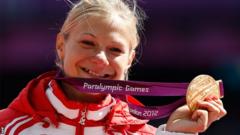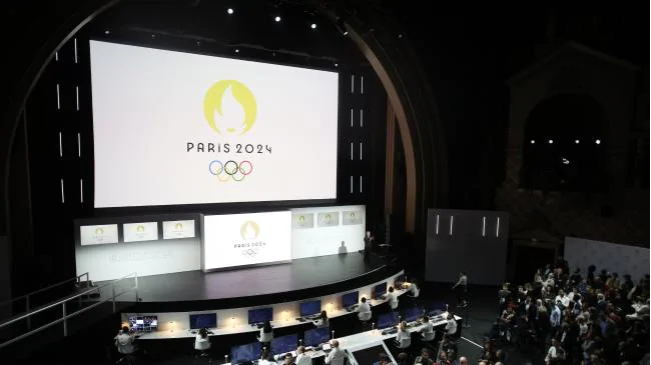This article is more than
8 year oldRio 2016 Olympics
The International Paralympic Committee (IPC) had opened suspension proceedings following the McLaren report, and has now confirmed the ban.
That report, published last month, detailed a state-sponsored doping programme operated by Russia.
The Russian Paralympic Committee is to appeal against the decision to the Court of Arbitration for Sport.
In contrast to the IPC, the International Olympic Committee (IOC) chose not to hand Russia a blanket ban from the Olympic Games.
The Rio 2016 Paralympics begin in 31 days' time, on 7 September, and 267 Russian athletes across 18 sports will now miss the Games.
"The anti-doping system in Russia is broken, corrupted and entirely compromised," said IPC president Sir Philip Craven at a news conference on Sunday.
"The Russian Paralympic Committee are unable to ensure compliance with and enforcement of the IPC anti-doping code and the world anti-doping code within their own national jurisdiction and they can not fulfil its fundamental obligation as an IPC member.
"As a result, the Russian Paralympic Committee is suspended with immediate effect."
Russian Paralympic Committee member Evgeniy Bukharov told BBC World Service: "I'm disappointed and really shocked. The IOC decided to stay for the rights of the clean athletes and only to fight against the athletes who are involved in doping.
"I spoke with my team-mates from the organising committee and saw the reaction of the Russian Paralympic team, the athletes and coaches. They are very frustrated with this decision. If someone over four years tries to do their best to participate in the Games, suddenly to hear that they should not participate frustrated them."
Craven's damning words
He added: "Tragically this situation is not about athletes cheating a system, but about a state-run system that is cheating the athletes. The doping culture that is polluting Russian sport stems from the Russian government.
"The Russian government has catastrophically failed its para-athletes. Their 'medals over morals' mentality disgusts me. The complete corruption of the anti-doping system is contrary to the rules and strikes at the very heart of the spirit of Paralympic sport.
"It shows a blatant disregard for the health and wellbeing of athletes and, quite simply, has no place in Paralympic sport. Their thirst for glory at all costs has severely damaged the integrity and image of all sport, and has certainly resulted in a devastating outcome for the Russian Paralympic Committee and Para-athletes."
Why was Russia banned?
Canadian law professor Richard McLaren's report found that Russia's sports ministry manipulated urine samples provided by its athletes between 2011 and 2015.
The report identified 27 samples relating to eight Para-sports, five of which are summer sports, including some governed by the IPC.
The IPC has also found evidence that samples were swapped during the Sochi 2014 Paralympic Games and it planned to reanalyse every Russian sample from Sochi.
The IPC allowed the Russian Paralympic Committee to present its case before it decided on the ban.
Paralympics takes a stand
The IOC was widely criticised for ignoring the World Anti-Doping Agency (Wada) recommendation to ban Russia from the Rio Olympics.
Instead, each individual sporting federation was given the power to decide if Russian competitors were clean to compete.
A three-person IOC panel then had the final say.
In the end, more than 270 Russian athletes were cleared to compete at the Olympics.
Reaction
US Anti-Doping Agency (Usada) chief executive Travis Tygart said the IPC's decision was "inspiring".
"The IPC showed strong leadership today in holding Russia's state-organised doping accountable," said Tygart. "Their unanimous decision goes a long way towards inspiring us all - most importantly clean athletes - and upholding the Paralympic values we admire."
Wada said it supported the decision, adding it was "is in the interest of clean athletes and the clean sport movement".
The British Paralympic Association said the IPC had taken a bold decision and congratulated it for taking a "clear stand".
"It is crucial for the integrity of our sport that those involved, as well as the public, feel confident that all necessary measures are in place to tackle doping and the playing field is level", a statement read.
Britain's Paralympic gold medallist and world champion Richard Whiteheadtold the BBC's World Service: "I feel that Paralympic sport will move forward and will be the shining light of what needs to happen within sport. Let's hope that other sporting governing bodies also take the same light. "
But the International Federation for Equestrian Sports (FEI) said it was "disappointed" and "troubled" by the IPC's decision.
FEI President Ingmar De Vos said: "We believe the individual International Federations should be given the opportunity to defend the rights of their clean athletes."
Analysis
BBC Sport's Chris McLaughlin: "It's the decision the IOC resisted - a blanket ban and a hardline approach from the Paralympic movement. Its head Sir Philip Craven said it was a decision that had given him sleepless nights but one that had to be taken in the interests of sport, going on to say the Russian sporting system was broken and corrupt.
"It may not be the end of the matter though, the Russians have already indicated they will appeal to the Court of Arbitration for Sport. But, as it stands, there will be no Russian athletes at the Paralympic Games here in Rio."
Which leading Para-athletes will miss out?

Margarita Goncharova (athletics)
Competes in the same T38 category as Britain's Sophie Hahn. Won 100m gold at London 2012, but Hahn won world titles in 2013 and 2015, beating the Russian on both occasions.
Goncharova would also likely have competed in the 400m (probably against Kadeena Cox), long jump (probably against Olivia Breen) and as part of the Russian 4x100m team which won silver behind GB at last year's Worlds.
Evgenii Shvetsov (athletics)
Won three golds in the T36 category at London 2012 - beating Britain's Paul Blake in both the 400m and 800m and compatriot Graeme Ballard in the 100m.
Blake also won silver behind him in the 400m at last year's Worlds in Doha.
Olesya Vladykina (swimming)
A big rival of Britain's Claire Cashmore in the SB8 100m breaststroke, beating her at almost every major championship since the 2008 Paralympics apart from the 2014 Europeans where they tied for gold.
Valeriia Shabalina (swimming)
The medals in the S14 events in Rio had looked like being a straight battle between Britain's Bethany Firth and Shabalina, who won three golds at the recent IPC Swimming Euros in Portugal, beating Firth in two of the events and setting two world records.
Darya Stukalova (swimming)
British swimmer Hannah Russell's main rival in the S12 category, especially in the 50m and 100m freestyle and the 100m backstroke.
Keywords
Newer articles
<p>Chinese officials say they "firmly oppose" the platform being divested.</p>
TikTok ban now ‘inevitable’
Israel Iran attack: Damage seen at air base in Isfahan
Ukraine ‘will have a chance at victory’ with new US aid, Zelenskyy says
Who will be Trump’s VP? A shortlist
Ukraine war: Kyiv uses longer-range US missiles for first time
House passes potential TikTok ban that could speed through Senate
How soon could US ban TikTok after Congress approved bill?
Caught between Israel and Iran, Jordan clings desperately to stability
Taylor Swift broke Spotify record with new album




